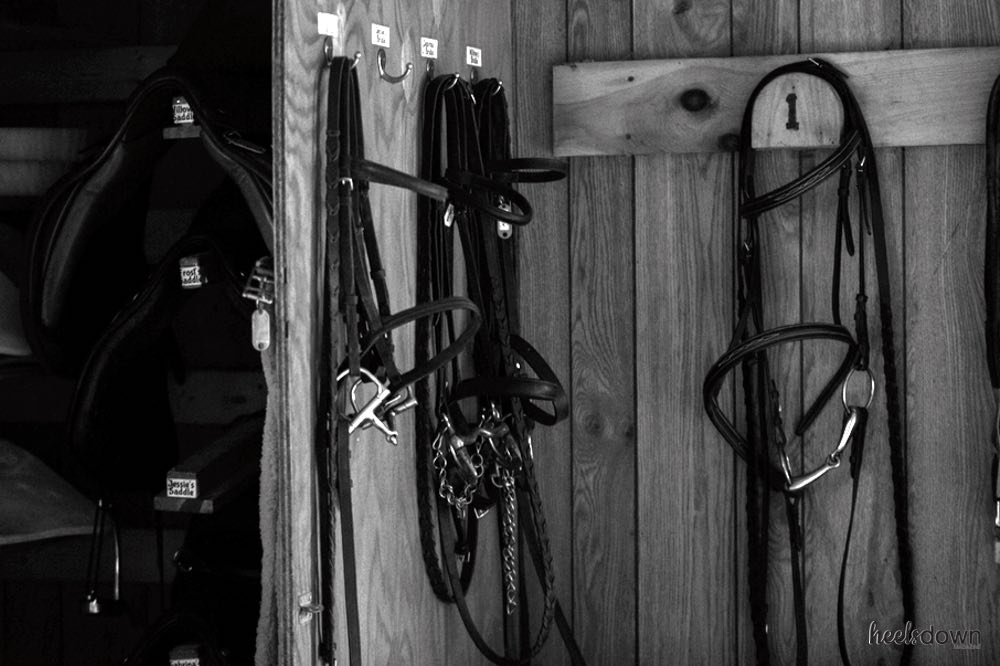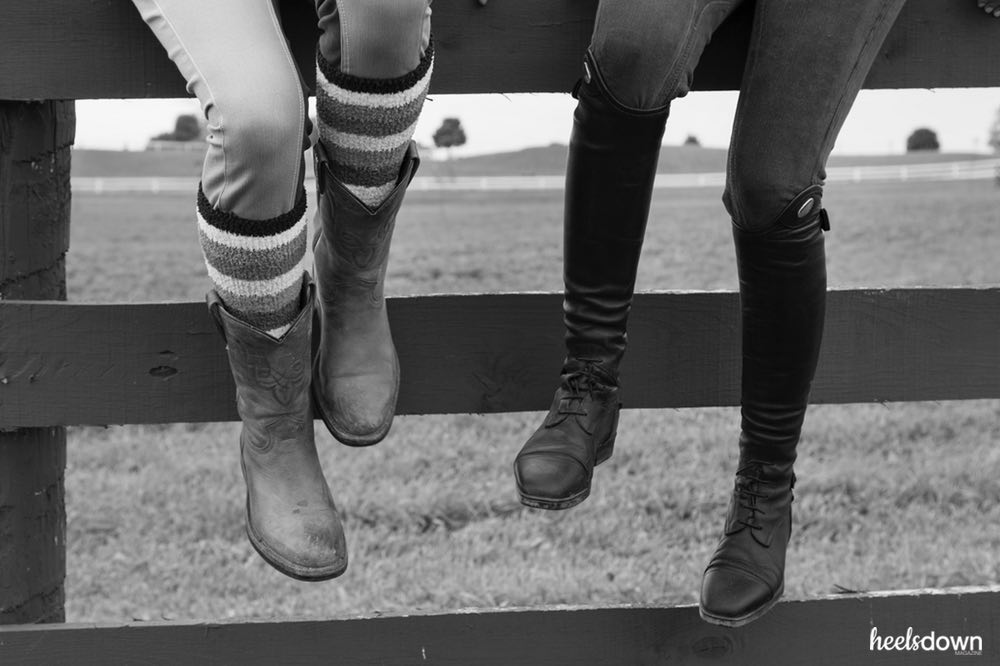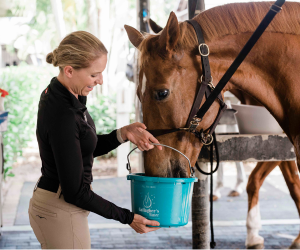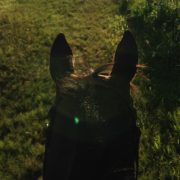Bullied at the Barn: Emotional Abuse from My Trainer Almost Broke Me

We would roll our eyes and cry on each others’ shoulders when we got called fat or stupid or worthless or, worst of all, a useless rider.
(Anonymous)
A couple times a year, I get together for coffee or lunch with my “horse sisters”. Even though we all ride at different barns now, it always feels as if no time has passed, and conversations retain the same giggly intimacy as they had years ago, when we would lean on pitchforks and gossip or whine or discuss our hopes and dreams.
Though we differ in ages and personalities, we use the big-little sister dynamics to give each other frank advice on men and career choices. When we see each other, we discuss love and horses and big life decisions.
We also swap coping techniques for dealing with the aftermath of our emotionally abusive former trainer.
It was a lucky day when I didn’t get bullied, belittled or shamed for what I was wearing, the way I talked, the way I cleaned my stall, or the way I rode.
It’s a long and messy story, in which our love for horses and riding was entangled with devotion to a mentor who, though she never physically harmed us, used manipulation, mockery and threats to control her students.
We knew it was happening, to a certain degree. We would roll our eyes and cry on each others’ shoulders when we got called fat or stupid or worthless or, worst of all, a useless rider. It was a lucky day when I didn’t get bullied, belittled or shamed for what I was wearing, the way I talked, the way I cleaned my stall, or the way I rode. And I was the “favorite one”.
As with any kind of abuse, it would have been easier to deal with had it not been mixed in with the good bits: the opportunities, the laughing, the affection, and the quality knowledge we gained about horses and riding. That, and each other, was what kept us from moving elsewhere for so many years.
The traumas I thought were out of sight, out of mind, are catching up.
We gradually uncovered lies that had been told about us by our trainer, to each other, in an attempt to prevent us from becoming close friends. Luckily, it had the opposite effect. We loved each other, despite the fictional stories we were told that we were lazy, greedy or selfish. We’ve now cleared away the mean lies and found out that we are, in fact, lovely, kind and strong women. We make sure to tell each other that, a lot.
Eventually we all left, moving our horses away one at a time over the course of years, with varying degrees of civility. Through the grapevine, we heard that some fellow ex-students were seeking therapy. Two of my close friends followed suit.
I still haven’t, even though I know I need to. Quick to defend that the rough treatment gave me an incredibly thick skin, I focused on my new life, trying to put a positive spin on the whole ordeal. But as I write this, I feel cold, shocked and shaky. I have the creeping feeling that something is following me. The traumas I thought were out of sight, out of mind, are catching up.

There is a brittle aspect to the toughness I described above. I physically wince when I get caught making a mistake, expecting to be made fun of or shamed. I feel incredibly nervous around trainers, even when they are kind to a fault (as, I have found out, many of them are). I often find myself paralyzed with the fear that one wrong move will ruin my reputation forever. I am surprised when people forgive me, for anything.
It is not normal to feel a sinking dread every time you walk into the barn.
Emotional abuse is hard to diagnose. Unlike physical abuse, where actions can be more black and white, it is conveyed in words, tone of voice and facial expressions. It is especially difficult to talk about in equestrian sport, where tough love is the norm.
As a rider, your trainer should tell you when you’re screwing up. They should give you a hard time when you don’t properly take care of your horse. They should tell you to work harder, try harder, and be better.
But I’m now finding out that it is not in their job description to shame you, especially publicly. It is not normal for a trainer to punish you through your horse, by putting them in a dirty stall with no water. It is not normal for your trainer spread false rumors about you.
It is not normal for your trainer to turn you against your friends and family by saying nasty things about them to you. It is not normal for your trainer to be angry at you when you tell them you’re going to college. It is not normal to feel a sinking dread every time you walk into the barn.
It’s time to let the monsters out of the closet, and ask for help in facing up to them.
I recently learned the definition of the word gaslighting: manipulating someone by psychological means into questioning their own sanity. Even now, I wonder if I’m the crazy one. If the nasty rumors are true – that I’m selfish and inconsiderate and, in my trainer’s words, of “poor moral character.”
This is part of the answer to the question “why didn’t I leave sooner?”. This happened over the span of almost 10 years, from my childhood into my late teens. It’s an influential period in a person’s life, and since I practically lived at the barn, it had become my “normal.” Essentially, I spent more time with my trainer than with my parents – who suggested repeatedly that I move barns.
They also told me many times that they thought the relationship I had with my trainer was unhealthy. For a reason unbeknownst to me, telling them that I wanted to “tough it out” made me feel strong and independent, like I had control over the situation. Asking for help was my equivalent of admitting defeat.
Asking for help is a sign of courage.
There was a complicated balance – I relied heavily on my trainer. She saw that I was dedicated to the sport, and would find me horses to ride and my own students to teach. She encouraged me to take an active role in managing the barn. I could tell that she was proud of me.
When I hit a “rough patch,” I started confiding in my barn friends instead of my parents, reasoning that they “understood” what I was going through, because they were being subjected to the same treatment.
This was not the best course of action. Victims can only help victims so much. If you suspect you are suffering from any kind of abuse, the first person you should tell is a trusted family member or figure, especially if you are a child or a teenager. Asking for help is a sign of courage. I think where I got confused is that my trainer was a trusted figure in my life. She wasn’t just a random bully at school. I had faith that what she was doing was in my best interest.
It’s time to start talking about the blurry line between tough love and emotional abuse.
It’s time to open the emotional boxes, kept tightly shut for so long that I’ve forgotten the contents. It’s time to deal with a poison that is slowly seeping into the good and loving life I’ve made for myself. It’s time to let the monsters out of the closet, and ask for help in facing up to them.
Our trainers are incredibly important mentors, especially to adolescents. They are good riders, excellent teachers, and inspirational figures. They can impart wisdom and instill qualities that go beyond just riding, and into our careers and personal lives. But it’s time to start talking about the blurry line between tough love and emotional abuse – because while my story is extreme, I know it’s not the only one.
For more stories worth reading, subscribe to Heels Down Magazine in the app on the iTunes AppStore: http://apple.co/1QicprS or Google Play http://bit.ly/1sXQV75.


